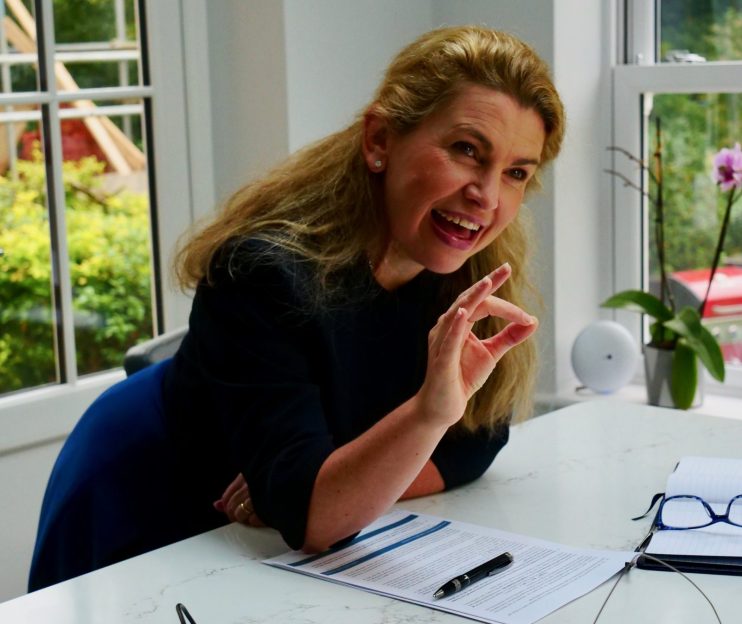
GPS points way for fintech’s future

When the government launched the independent review of the UK’s fintech sector three months ago, the mood music was warmly received by Joanne Dewar.
“The UK is one of the leading places in the world to start and grow a fintech firm, and I am determined to ensure this continues,” John Glen, economic secretary to the Treasury and City minister, said at the time.
Dewar is chief executive of Global Processing Services (GPS), the global payments processing partner for challenger brands including Revolut and Starling Bank – and an enthusiast for championing Britain’s fintech capabilities.
So, anything the government says and does to help is welcome, and Dewar has since become involved in the review’s ‘international attractiveness’ workstream. She has also recently accepted an invite from the Department for International Trade (DIT) to be a ‘London Export Champion’, part of an export promotion campaign.
The timing fits because London-headquartered GPS has overseas offices in Singapore and Sydney to support their customers across APAC – and this week announced that it has received significant investment from strategic partner Visa, aimed at driving further overseas growth.
‘Fintech apps know no borders’
Dewar sees opportunities across the globe for GPS. “Fintech apps know no borders,” she tells City AM, describing some of the international tailwinds blowing in the industry’s favour: from smart-phone popularity to the transition away from cash towards digital payments.
But she adds that adding extra flags to the GPS corporate map can be “complex, particularly outside Europe – regions are highly fragmented so regulatory requirements need to be carefully evaluated and new issuing bank relationships need to be created on a market by market basis.”
GPS – which also has a UK office in Newcastle-upon-Tyne and employs over 150 staff – is certified by Visa and Mastercard to process and manage credit, debit and prepaid card transactions worldwide. In Dewar’s words, the company provides the technical connectivity that makes payments happen, while remaining invisible to end-customers.
Overall, it supports many hundreds of card programmes in 60 countries, across more than 150 currencies. Its Singapore office was established last year after help from the DIT’s Fintech Bridges programme and the Singaporean Economic Development Board. GPS wants to double its global headcount in the next couple of years.
Investors looking ‘deeper into fintech value-chain’
Dewar joined GPS seven years ago, not long after its inception, and has since led its journey from founder-owned start-up to private-equity-backed scale-up (the company received investment from UK private equity firm Dunedin in 2018).
She describes the company as having “powered” Europe’s shift towards digital banking. “Essentially the main fintech players wouldn’t be where they are today without us,” she says, explaining that GPS’ back-end tech has helped both Revolut and Starling’s stellar growth.
In Asia-Pacific, GPS has delivered successful programmes for companies including Singapore’s Razer Fintech, Australian digital bank Xinja and Hong Kong’s WeLab Bank. The company has also worked closely with Visa to deliver a ‘next-generation showcase product’ for VIP guests at the Japan Olympics, pushed back to 2021 because of coronavirus.
The UK saw record amounts of fintech investment last year, but investment clearly took a knock during the pandemic.
“Investors are getting pickier – they are looking deeper into the fintech value-chain,” says Dewar. “But regardless of who ultimately wins in the challenger bank race – the neo-banks, the incumbents fighting back or the new breed of e-wallet providers – one common denominator is that they are nearly all underpinned by third-parties such as ourselves.”
‘Our regulators are seen to be leading the world’
Buoyed by the new investment, GPS is looking to replicate its European and Asia-Pacific accomplishments across the Middle East as one of Visa’s preferred processors.
The company is aiming to have a base in Dubai before the year-end – Dewar is scheduled to be there next month as a speaker at Seamless Middle East 2020. Saudi Arabia, Egypt and Pakistan are among other MENA countries in GPS’ sights, potentially to be serviced from Dubai.
She believes that being a British financial services company is definitely a reputational advantage in the global market. “Our regulators, the Financial Services Authority and the Prudential Regulation Authority, are genuinely seen to be leading the world,” she says.
Dewar has confidence specifically in fintech’s own prospects, too. “British fintech is a growth industry in an environment where we’re otherwise struggling to identify the growth industries,” she says.